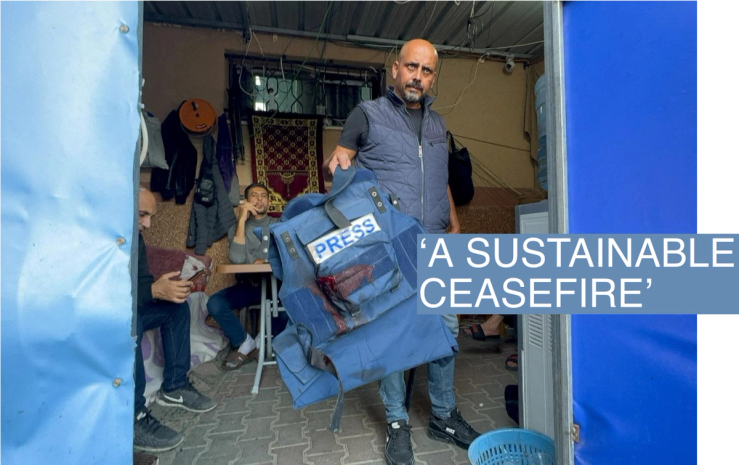The News
U.S. Defense Secretary Lloyd Austin visited Israel today, reportedly to pressure the country’s government to moderate its offensive in Gaza. His trip comes after France, Britain, and Germany called for a ceasefire, amid mounting numbers of civilian, journalist, and aid-worker fatalities in the Gaza Strip.
“We must do all we can to pave the way to a sustainable ceasefire, leading to a sustainable peace. The sooner it comes, the better — the need is urgent,” the U.K.’s David Cameron and Germany’s Annalena Baerbock wrote in an op-ed published by The Times of London.
The Israeli government has so far resisted calls to end its bombardment of Gaza. “Any call for a ceasefire with Hamas is a prize for terrorism and we won’t agree to it,” Israeli Foreign Minister Eli Cohen said.
SIGNALS
Hostage killings spark condemnation at home
Israel is coming under growing pressure domestically. Last week, the Israel Defense Forces (IDF) killed three unarmed hostages who had escaped from their captors in Gaza, sparking outrage and spurring calls from the families of hostages for Israel to return to negotiations over their release. The funeral for one of the hostages was attended by 1,500 people, but no representatives from the Israeli government made an appearance, the Times of Israel reported. “We all warned that the fighting would likely harm the hostages,” former hostage Raz Ben-Ami said at a weekend protest. There’s “a real gap between the formal rules of engagement and the practice on the battlefield,” Israeli military expert Yagil Levy told The New York Times.
Netanyahu is well-versed in ignoring U.S. pressures
Israeli Prime Minister Benjamin Netanyahu has so far resisted U.S. calls to halt the conflict. Going toe-to-toe against Washington is a routine Netanyahu knows well, Ian Parmeter, a research scholar at the Australian National University’s Centre for Arab and Islamic Studies, argued in The Conversation. “He is practised at staring down US presidents, particularly Democratic ones,” Parmeter wrote, noting the Israeli prime minister’s defiance of former President Barack Obama’s call in 2009 to halt settlement building in the West Bank. Netanyahu’s defiance is helped by the incomplete picture many Israelis have of the conflict: Images from Gaza are not shared widely on Israeli media, meaning Israelis see a sanitized version of the war, the Australian Broadcasting Corporation recently reported.
Journalists, aid workers killed in conflict
The threat to journalists amid the conflict has some questioning how much longer they can continue their work. Several Palestinian reporters have said they would need to cease their work out of concern for their lives and the lives of their families, Time magazine reported. Journalists in Gaza are a link to information not only for Palestinians, but for international reporters who cannot independently report what is happening on the ground. At least 64 journalists have been killed while covering the war, the Committee to Protect Journalists said. “This deadly pattern is becoming more deadly,” Sherif Mansour, who works with the CPJ, told Time. “That’s why many of them feel there is no more time for them to continue reporting.” The organization, which advocates for press freedom internationally, said the past 30 days have been the deadliest month for journalists worldwide since it began gathering data in 1992.



